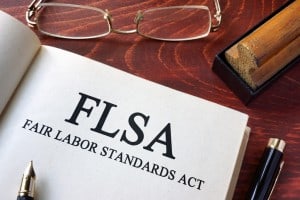 A major misconception held by many employers and employees is that any employee who receives a salary is not eligible to receive overtime pay. Although earning a salary is one of the criteria listed for each of the exemptions, it is only one of many. If all of the requirements under an exemption are not satisfied, you are not exempt, and are owed overtime pay.
A major misconception held by many employers and employees is that any employee who receives a salary is not eligible to receive overtime pay. Although earning a salary is one of the criteria listed for each of the exemptions, it is only one of many. If all of the requirements under an exemption are not satisfied, you are not exempt, and are owed overtime pay.
In addition, if you are paid a salary from your employer, but your employer deducts your pay when you have to leave early, miss work, or are late, your employer may not be able to classify you as exempt and must pay you overtime for any time you put in over 40 hours during the work week.
The most common exemptions to overtime pay
According to the FLSA, employers are required to pay workers at least minimum wage in addition to time-and-a-half for all hours exceeding 40 hours per week. However, this standard requirement includes some statutory exemptions. The most common overtime exemptions are often referred to as the three “white collar exemptions,” in addition to the outside sales exemption mentioned below:
Professional exemption
The professional exemption relieves employers from having to pay overtime to those individuals who operate in the “learned professions.” In order to fall under this exemption, employees must qualify as follows:
- Employees must receive compensation of at least $455 per week on a salary or fee basis.
- Employees’ major responsibility must involve the performance of work that includes the application of advanced knowledge. This intimates work of a particular intellectual character involving the routine exercise of independent discretion and judgment.
- The “advanced knowledge” must be of the sort routinely obtained by a lengthy period of dedicated intellectual instruction and learning.
- The work in which the advanced knowledge is applied must be in a science such as engineering, chemistry, biology, or physics, or in what is referred to as a “learned profession” such as medicine, theology, law, or architecture.
Executive exemption
The Department of Labor (DOL) mandates that employees meet all of the criteria mentioned below if they are to qualify for an executive exemption:
- Employees must be paid on a salary basis (not fee or hourly) at a $455 minimum rate per week.
- The primary duty of these employees must be enterprise management or the management of a commonly recognized subdivision or department within the enterprise.
- These employees must have authority to hire and fire other employees, or else, their recommendations and suggestions regarding the status change of other employees (including hiring and firing) must be given particular credence.
- They must oversee and direct the work of two other full-time employees (at a minimum) or their equivalent.
Administrative exemption
According to the rules set by the Wage and Hour Division of the U.S. Department of Labor, employees’ duties qualify them under an administrative exemption from overtime pay when the following criteria are met:
- The primary job responsibility of these employees must be the performance of non-manual or office work related directly to the general business operations or management of the employer or the employer’s customers.
- The primary duty of these employees must also involve the application of independent judgment and discretion regarding significant matters within the organization.
- Employees must receive compensation on a fee or salary basis in the amount of $455 per week minimum.
Outside sales exemption
The DOL requires employees meet the following criteria in order to fall under the outside sales exemption from overtime pay:
- These employees must have the primary responsibility of acquiring sales (as the FLSA defines such) or obtaining contracts or orders for the use of facilities or services for which the customer or client will pay a consideration
- These employees must be routinely and customarily operating away from the employer’s place or place of business
No minimum salary requirement is present for this overtime pay exemption.
For all the exemptions listed above, the primary duty of the employee must meet the specific requirements of the exemption. Otherwise overtime must be paid to the employee.
If you have been misclassified by your employer under an exemption from overtime pay, our team at The Gilbert Firm can help. We have a strong reputation in Tennessee as effective employment law advocates and have successfully handled FLSA cases throughout the Southeast and beyond. To set up a free consultation about your case, call us today at 888-996-9731 or fill out our contact form. Attorney Clint Scott from our team can help you with your overtime claim. We have offices in Nashville, Chattanooga, Memphis, Jackson, and Knoxville for your convenience.
 In recent years, the U.S. Supreme Court has favored the interests of businesses over their employees in matters related to the employer-employee relationship. That trend seemed poised to continue.
In recent years, the U.S. Supreme Court has favored the interests of businesses over their employees in matters related to the employer-employee relationship. That trend seemed poised to continue. California Governor Jerry Brown has signed a law that would impose partial liability on retailers for port trucking company labor violations. This represents a dramatic adjustment in the relationship between the trucking companies that deliver goods to the Los Angeles harbor area and some of the most powerful brands in the nation.
California Governor Jerry Brown has signed a law that would impose partial liability on retailers for port trucking company labor violations. This represents a dramatic adjustment in the relationship between the trucking companies that deliver goods to the Los Angeles harbor area and some of the most powerful brands in the nation. Numerous retail employees across Tennessee are compensated through draw-on-commission payment structures. While this is common practice within the retail industry, a recent Federal Court ruling addressed concerns about the legal appropriateness of these payment structures. As reported by the
Numerous retail employees across Tennessee are compensated through draw-on-commission payment structures. While this is common practice within the retail industry, a recent Federal Court ruling addressed concerns about the legal appropriateness of these payment structures. As reported by the  Enacted in 1938, the Fair Labor Standards Act (FLSA) regulates employment issues including minimum wage, eligibility for overtime pay, record keeping, lunch breaks, and child labor standards in the private sector. It governs qualified employers in the private sector and local governments, in Tennessee, and the across the nation. The rules govern full-time and part-time employees. There are some
Enacted in 1938, the Fair Labor Standards Act (FLSA) regulates employment issues including minimum wage, eligibility for overtime pay, record keeping, lunch breaks, and child labor standards in the private sector. It governs qualified employers in the private sector and local governments, in Tennessee, and the across the nation. The rules govern full-time and part-time employees. There are some  A new house bill, named the
A new house bill, named the  We work to live; not the other way around. For this reason, the law provides that workers should be paid extra for overtime in certain circumstances. The
We work to live; not the other way around. For this reason, the law provides that workers should be paid extra for overtime in certain circumstances. The  Tennessee workers have many wage and hour rights. Asserting those rights can often mean substantial pay benefits and better working conditions. Here are a few of the questions employees often ask about in meetings and consultations with a Tennessee employment lawyer from the Gilbert Firm.
Tennessee workers have many wage and hour rights. Asserting those rights can often mean substantial pay benefits and better working conditions. Here are a few of the questions employees often ask about in meetings and consultations with a Tennessee employment lawyer from the Gilbert Firm. A recent report by the
A recent report by the  When Andrew Puzder, President Trump’s original choice for Secretary of the Department of Labor, withdrew his name, employee rights advocates let out a collective sigh of relief. Now that the President’s newest nominee, Alexander Acosta, has been advanced to a full Senate vote, many of us are wondering exactly what his stance will be when it comes to the rights of workers, here in Tennessee and across the country.
When Andrew Puzder, President Trump’s original choice for Secretary of the Department of Labor, withdrew his name, employee rights advocates let out a collective sigh of relief. Now that the President’s newest nominee, Alexander Acosta, has been advanced to a full Senate vote, many of us are wondering exactly what his stance will be when it comes to the rights of workers, here in Tennessee and across the country.